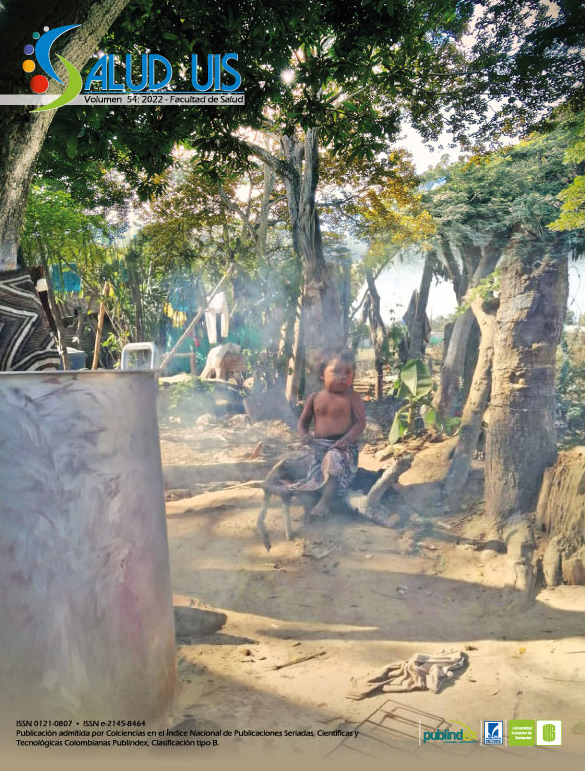Abstract
Introduction: This systematization gathers the richness of the field notes written by seven interviewers from seven
cities in Colombia (Bogotá, Medellin, Cali, Barranquilla, Bucaramanga, Manizales and Pasto), carried out during a
test pilot, where their dynamics and learning were recognized. Objective: To systematize experiences of itineraries to the territories, as well as childbirth from the voices of the interviewers. Methods: The methodological process presented three phases designed to follow the methodology of systematization of experiences. Reconstruction phase; interpretation phase and experience empowerment phase. Results: Three categories of analysis were evidenced: the journey and the environment, the convergences in motherhood and the experience of childbirth. Conclusions: The field notes of the pollsters became a primary source of inhomogeneous and highly diverse information. It became essential to analyze their experiences during their transfers to the fields and thus apply an intersectoral approach to understand and interpret what they heard from the surveyed mothers: warm and respectful circumstances when receiving clinical care of childbirth, as well as situations of abuse in obstetric care that are and have been culturally hierarchical by the medicalization of childbirth, constituting a subordinate position towards the patient.
References
Jara-Holliday O. Sistematización de experiencias: un concepto en construcción. En: Cerquera-Bernal AL. La sistematización de experiencias: práctica y teoría para otros mundos posibles. Bogotá: Javegraf; 2018. p. 51-73.
De Souza JF. Sistematización: un instrumento pedagógico en los proyectos de Desarrollo Sustentable. CREFAL [Internet]. 2000. Disponible en: http://centroderecursos.alboan.org/ebooks/0000/0713/6_SOU_SIS.pdf
Aguirre MA. Sistematización de experiencias. Bogotá Rev Int Magisterio, junio-julio. 2008; No. 33:8. https://cepalforja.org/sistem/documentos/revista_magisterio_33.pdf
Instituto de Desarrollo Económico y Social. De las notas de campo a la teoría. Descubrimiento y redefinición de nagual en los registros chiapanecos de Esther Hermitte. Alteridades [Internet]. 2001; 11(21): 65-79. Disponible en: https://alteridades.izt.uam.mx/index.php/Alte/article/view/396
Otteneberg S. Thirty Years of fieldnotes: Changing relationships to the text. En: R. Sanjek. Fieldnotes: The Makings of anthropology. New York: Cornell University Press; 1990. p. 139-160.
Jackson JE. I am a Fieldnote: Fieldnotes as a symbol of professional identity. En: R. Sanjek. Fieldnotes: The Makings of anthropology. New York: Cornell University Press; 1990. p. 3-33.
Barnechea MM, González E, Morgan MDLL. La sistematización como producción de conocimientos. La Piragua. 1994; 2(3): 1-10.
Uribe-García JA. El testimonio de las víctimas como recurso pedagógico. Aportaciones para el posconflicto colombiano. Prax Saber. 2018; 9(20): 97-118. doi: https://doi.org/10.19053/22160159. v9.n20.2018.8297
Leifheit KM, Schwartz GL, Pollack CE, Edin KJ, Black MM, Jennings JM, et al. Severe housing insecurity during pregnancy: association with adverse birth and infant outcomes. Int J Environ Res Public Health. 2020; 17(22): 1-12. doi: https://dx.doi.org/10.3390%2Fijerph17228659
Adewumni B. Kimberlé Crenshaw on intersectionality: “I anted to come up with an everyday metaphor that anyone could use”. The New Statesman. 2014. Disponible en: http://www.newstatesman.com/lifestyle/2014/04/kimberlcrenshaw-intersectionality-i-wanted-comeeveryday-metaphor-anyone-could
Cole BA. Gender, Narratives and intersectionality: Can personal experience approaches to research contribute to “undoing gender”? Int Rev Educ. 2009; 55: 561-578. doi: https://doi.org/10.1007/s11159-009-9140-5
Almendra LG. Percepción de las adolescentes sobre la atención humanizada durante el trabajo de parto. Tesis de grado de Licenciada en Enfermería. http://rdi.uncoma.edu.ar/handle/uncomaid/15592
Organización Mundial de la Salud. Declaración sobre la Prevención y erradicación de la falta de respeto y el maltrato durante la atención del parto en centros de salud [Internet]. Organización Mundial de la Salud; 2014. Disponible en: http://apps.who.int/iris/bitstream/handle/10665/134590/WHO_RHR_14.23_spa.pd.
Orozco-Galván AI, Rocha-Sánchez TE. Violencia Obstétrica. Una revisión crítica y feminista en torno al tema. 2017. Disponible en: https://www.uaeh.edu.mx/xiii_congreso_empoderamiento_fem/documentos/pdf/C004.pdf
Obregón-Yánez LE. Primigesta de edad avanzada.Rev Obstet Ginecol Venez. 2007; 67(3): 152-166.
Fernández-Niño JA, Rojas-Botero ML, BojorquezChapela I, Giraldo-Gartner V, Aleksandra Sobczyk R, Acosta-Reyes J, et al. Situación de salud de gestantes migrantes venezolanas en el Caribe colombiano: primer reporte para una respuesta rápida en Salud Pública. Rev la Univ Ind Santander Salud [Internet]. 2019; 51(3): 208-219. doi: https://doi.org/10.18273/revsal.v51n3-2019004
Cruz-Cañón LN. El doloroso parto de las venezolanas en Colombia. [Internet]. Bogotá -Colombia; 2019. Disponible en: https://cerosetenta.uniandes.edu.co/el-doloroso-parto-de-las-venezolanas-en-colombia/
Baeza F, Cilveti C, Fernández MI, Purcell V, Vásquez C, Riquelme-Hernández G. Significado de la experiencia del embarazo, parto y puerperio en la mujer migrante en Chile. Matronas Prof. 2020; 20(4): 13-19.
Laguado-Jaimes E, Gómez-Díaz MP. Teoría del manejo de síntomas desagradables para el cuidado de enfermería en cirugía. Enferm Glob. 2014; 13(3): 326-337.
Giraldo-Montoya DI, González-Mazuelo EM, Henao-López CP. Experiencias de las mujeres durante el trabajo de parto y parto. Av Enfermería. 2016; 33(2): 271-281. doi: http://dx.doi.org/10.15446/av.enferm.v33n2.42279
Singata M, Tranmer J, Gyte GML. Restricting oral fluid and food intake during labour. Cochrane Database Syst Rev. 2013; 2013(8). doi: https://doi.org/10.1002/14651858.D003930.pub3
Borges-Damas L, Sánchez-Machado R, DomínguezHernández R, Sixto-Pérez A. El parto humanizado como necesidad para la atención integral a la mujer. Rev Cuba Obs Ginecol. 2018; 44(3): 1-12.
Morrone B. Violencia obstétrica: cuando las leyes no alcanzan [Internet]. 2001. Disponible en: http://sedici.unlp.edu.ar/handle/10915/57173
Gobierno Colombiano, Ministerio de Salud y Protección Social. Guía operativa para la valoración de la calidad y humanización de las atenciones de protección específica y detección temprana a mujeres gestantes, niños y niñas en la Ruta Integral de Atención- RIA. Gobierno Colombiano, Ministerio de Salud y Protección Social;2015. p. 1-60. Disponible en: https://www.minsalud.gov.co/sites/rid/Lists/BibliotecaDigital/RIDE/VS/PP/guiaoperativa-valoracion-calidad-humanizacion.pdf
Gobierno Colombiano, Ministerio de Salud y Protección Social. Resolución No. 3280 de 2018 Por medio de la cual se adoptan los lineamientos técnicos y operativos de la Ruta Integral de Atención para la Promoción y Mantenimiento de la Salud y la Ruta Integral de Atención en Salud para la población Materno Perinatal y se establecen la directrices para su operación. 2018 p. 1-347. Disponible en: https://www.minsalud.gov.co/sites/rid/Lists/BibliotecaDigital/RIDE/DE/DIJ/resolucion-3280-de-2018.pdf
Macias-Intriago MG, Haro-Alvarado JI, PilosoGómez FE, Galarza Soledispa GL, Quishpe-Molina MDC, Triviño-Vera BN. Importancia y beneficios del parto humanizado. Dom Ciencias. 2018; 4(3): 392-415.

This work is licensed under a Creative Commons Attribution 4.0 International License.
Copyright (c) 2022 Elba María Bermúdez-Quintana, Cristina María Mejía-Merino, Leidy Johanna Morales-Giraldo, Laura Cano-Bedoya, Ligia Esther Cantillo-Barrios+
